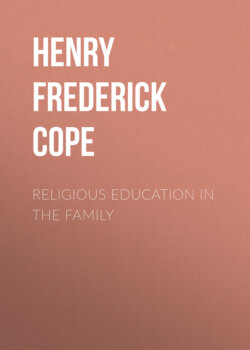Читать книгу Religious Education in the Family - Henry Frederick Cope - Страница 31
На сайте Литреса книга снята с продажи.
§ 2. WHAT IS RELIGIOUS EDUCATION?
ОглавлениеTo make this the more clear we may need to clarify our minds as to certain popular conceptions of education. Education means much more than instruction; religious education means much more than instruction in religion. Many habitually think of an educational institution as necessarily a place where pupils sit at desks and teachers preside over classes, the teachers imparting information which is to be memorized by the pupils, so that, from this point of view, a Sunday school would be almost the only institution for the religious education of children in existence, because it is the only one exclusively devoted to imparting instruction to children in specifically religious subjects. Such a view would limit religious education in the home to the formal teaching of the Bible and religious dogma by parents. The memorizing of scriptural passages and of the different catechisms once constituted a regular duty in almost all well-ordered homes. Today it is rarely attempted. Does that mean that religious education has ceased in the home?
But education means much more than instruction. Education is the whole process, of which instruction is only a part. Education is the orderly development of lives, according to scientific principles, into the fulness of their powers, the realization of all their possibilities, the joy of their world, the utmost rendering in efficiency of their service. It includes the training of powers of thought, feeling, willing, and doing; it includes the development of abilities to discern, discriminate, choose, determine, feel, and do. It prepares the life for living with other lives; it prepares the whole of the life, developing the higher nature, the life of the spirit, for living in a spiritual universe.
Religious education, then, means much more than instruction in the literature, history, and philosophy of religion. It means the kind of directed development which regards the one who is developing as a religious person, which seeks to develop that one to fulness of religious powers and personality, and which uses, as means to that end, material of religious inspiration and significance and, indeed, regards all material in that light. Religious education seeks to direct a religious process of growth with a religious purpose for religious persons. Religious education is the spirit which characterizes the work of every educator who looks on the child as a spiritual nature, a religious person; it is the work of every educator who sees his aim as that of training this spiritual person to fulness of living in a society essentially spiritual.
In simplest possible terms, religious education means the training of persons to live the religious life and to do their work in the world as religious persons. It must mean, then, the development of character; it includes the aim, in the parents' minds, to bring their children up to the measure of the stature of the fulness of Christ. It is evident that this is a much greater task, and yet more natural and beautiful, than mere instruction in formal ideas or words in the Bible or in a catechism; that it is not and cannot be accomplished in some single period, some set hour, but is continuous, through all the days; that it pervades not only the spoken words, but the actions, organization, and the very atmosphere of the home.
